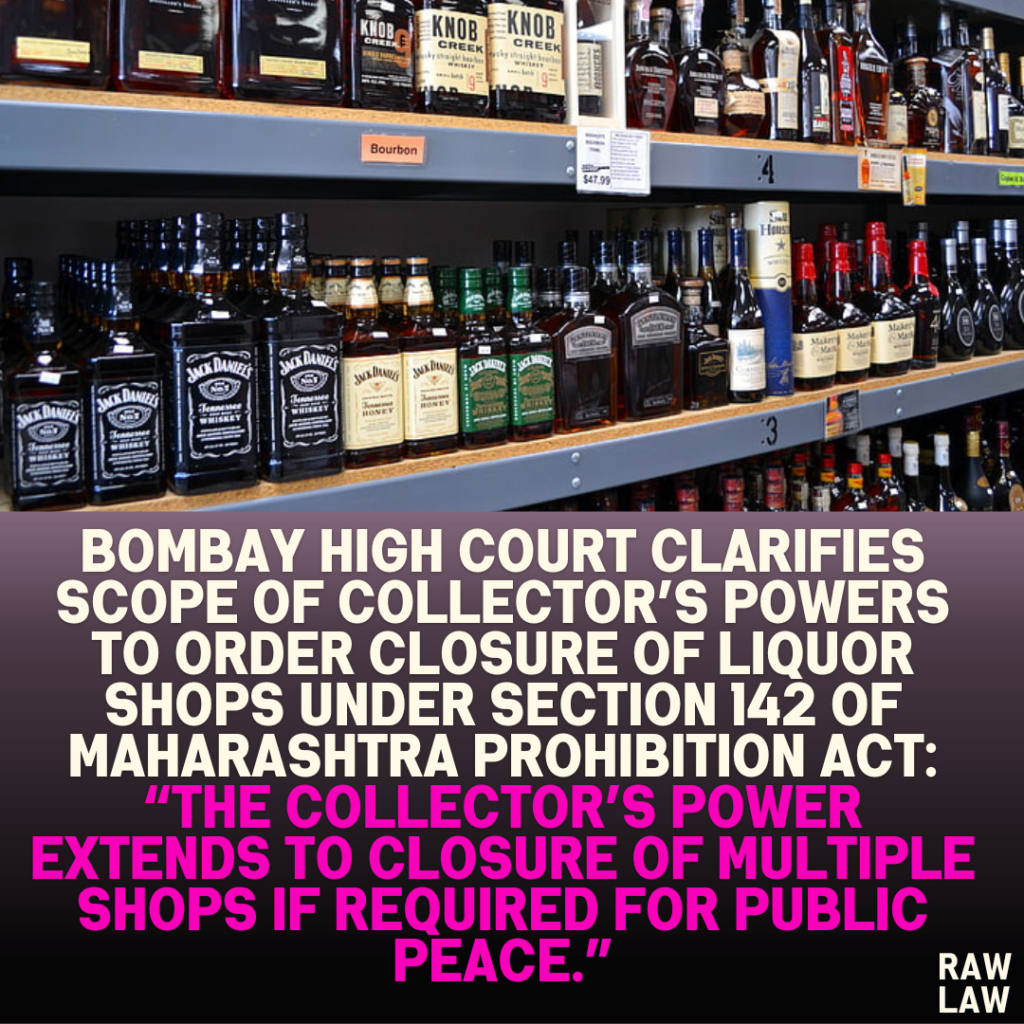Court’s Decision:
The Bombay High Court ruled that the Collector’s powers under Section 142(1) of the Maharashtra Prohibition Act, 1949, are not limited to ordering the closure of a single shop or place. Instead, the Collector has the authority to issue directions for the closure of multiple liquor shops in the district if such a measure is deemed necessary to maintain public peace. The court emphasized that the exercise of such power must be based on a reasonable opinion that the closure is in the interest of public peace, and must be applied through specific, rather than general, directions in writing.
Facts:
The case arose from three petitions challenging the orders of District Collectors, who had directed the closure of multiple licensed liquor shops across their respective districts on April 14, 2024, in observance of Dr. Babasaheb Ambedkar Jayanti. The petitioners, who held licenses under FL-I, FL-II, and FL-III categories for the sale of imported and Indian-made foreign liquor, argued that the closure orders violated the law as they affected multiple outlets rather than specific locations. They contended that the Collector’s power under Section 142(1) was limited to the closure of individual shops only.
Issues:
The primary legal issue was whether the Collector’s power under Section 142(1) of the Maharashtra Prohibition Act extended to ordering the closure of multiple liquor shops in an entire district or if it was confined to a singular shop or place.
Petitioner’s Arguments:
- Interpretation of Section 142(1): The petitioners argued that Section 142(1) should be interpreted narrowly, applying only to specific shops and not all outlets in a district. They relied on earlier judicial interpretations, which supported the view that the Collector could not issue blanket orders affecting the entire district.
- Non-compliance with Licensing Rules: They further argued that the orders were invalid as they did not comply with Rule 9-A(2)(d) of the Maharashtra Foreign Liquor (Sale on cash, register of sales, etc.) Rules, 1969, which mandates a seven-day prior notice in the Official Gazette and a local newspaper before declaring a “dry day.”
Respondent’s Arguments:
- Broad Powers Under Section 142: The State contended that Section 142(1) provides the Collector with broad powers to maintain public peace, including the authority to order closure of multiple shops if necessary. The power is independent of other statutory provisions and is triggered by the Collector’s reasonable opinion regarding public peace.
- Public Peace Over Business Rights: The respondents emphasized that trade in liquor is not a fundamental right, and reasonable restrictions can be imposed to ensure public peace, citing Supreme Court rulings that liquor trade falls outside the protection of Article 19(1)(g) of the Constitution.
Analysis of the Law:
The court noted that Section 142(1) of the Maharashtra Prohibition Act allows the Collector to direct the closure of “any place” where intoxicants are sold if it is deemed necessary in the interest of public peace. The court clarified that the term “any place” could not be interpreted to mean only a singular place and can include multiple shops if the situation warrants it. The word “place” in Section 142(1) was examined with reference to the Rules of 1969 and 1973, which refer to “licensed premises” rather than specific geographical units, indicating that the closure could apply to multiple establishments.
Precedent Analysis:
The court examined earlier judgments, including Parbhani Jilla Daru Vikreta Sanghatana v. State of Maharashtra, which interpreted “any place” narrowly. The present bench disagreed with this interpretation, stating that the Collector’s powers should be understood broadly to encompass multiple locations, provided the action is justified by the need to maintain public peace.
Court’s Reasoning:
The court reasoned that the objective of Section 142 is to maintain public peace, and restricting the Collector’s power to closing a single shop would defeat this purpose. The words “any place” must be read in the context of the law’s purpose, which is to enable the Collector to act swiftly and effectively in the interest of public peace. The court also highlighted that the exercise of such power must be based on a specific assessment and cannot be arbitrary.
Conclusion:
The court concluded that the Collector’s power under Section 142(1) is not limited to ordering the closure of a single shop but extends to multiple establishments, provided the measure is necessary to ensure public peace. The orders of closure must be specific to the licensed premises and based on a reasonable opinion formed by the Collector. The petitions were referred back to the original Division Bench for a decision on merits.
Implications:
This ruling clarifies the scope of the Collector’s powers under the Maharashtra Prohibition Act, allowing for broader application in situations that require maintaining public peace. It sets a precedent for interpreting similar provisions in other regulatory statutes, where public interest and safety are prioritized over business interests. License holders will now need to be more vigilant, as the Collector’s orders can affect multiple outlets simultaneously if justified.
